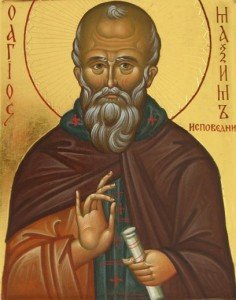In the last issue I shared with my readers that fact that deification “in Christ” is necessarily the result of a freely accepted new birth in the Spirit and that Jesus himself, according to Maximus, has taken this choice in his humanity. Having reminded his readers that, according to the Genesis account, the man was first formed from clay in his physical reality and that afterwards God breathed the Spirit into him, Maximus recalls the birth of Christ in Bethlehem and then the descent of the Spirit at his baptism by John. Both of these two births were assumed by Christ. “The Incarnation,” Maximus writes, “took first the form of a bodily birth because of my incompleteness, but it was then accompanied by a birth in the Spirit at baptism, so that I may be saved by grace, so that I may be recalled, or, more clearly, so that I may be created again.”
Free human decision and free conversion, sealed by the Spirit at baptism, are therefore the conditions of a synergy between human freedom and divine grace, which makes deification possible through the sharing of that humanity which, in Christ, was assumed by the Logos, deified, and made present in the church through the Eucharist. That encounter and that sharing are effected by the Spirit – the Spirit which came upon Mary, which descended upon Christ in the Jordan, which was sent by Christ upon his disciples after the resurrection, which is invoked by the church in the Eucharistic mystery, and which effects the equally mysterious encounter between God and each human soul. Thus, “through His flesh”, writes Maximus, “the Son has manifested the Father whom humanity was unable to truly know, and through the Spirit He led to the Father those whom He had joined with Himself.”
In Christ, the two natures – divine and human – were united into the single personal existence of the incarnated Son of God. Both were dynamic realities, expressed in the two wills of Christ. But theirs was not a simple alliance or juxtaposition between concurring wills, but a communion, in which there was a real communication of properties, a true and real penetration of divine energy into humanity with the free acceptance of deification by Christ’s human will, effected through the Spirit. And it is the same Spirit that effects the union of those who freely choose to be “in Christ” with the deified humanity of the New Adam.

